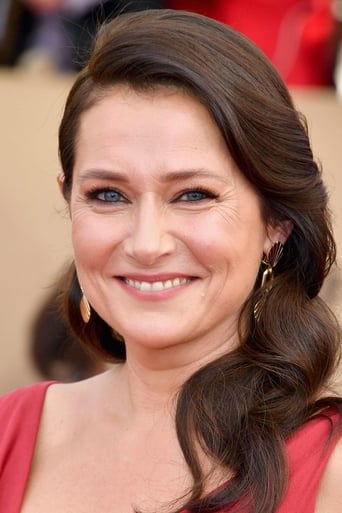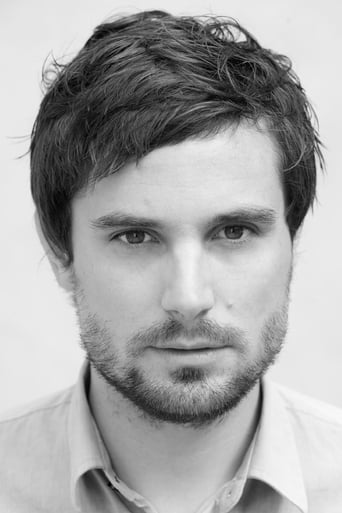Alicia
I love this movie so much
AniInterview
Sorry, this movie sucks
Beystiman
It's fun, it's light, [but] it has a hard time when its tries to get heavy.
Kimball
Exactly the movie you think it is, but not the movie you want it to be.
Lee Eisenberg
Susanne Bier first came to my attention when her "In a Better World" won Best Foreign Language Film at the Academy Awards in 2011. I haven't see that one but I did see her "Serena", starring Jennifer Lawrence and Bradley Cooper. I only now got around to seeing her Academy Award-nominated "Efter brylluppet" ("After the Wedding" in English).The focus is Jacob, a man from Denmark running an orphanage in Bombay. With the orphanage running short of funds, a Danish company offers to donate money to keep it open, provided that Jacob returns to Denmark to collect it. It's while he's in Denmark that the plot begins to unfold, as events there connect to Jacob's past.If you've seen any Scandinavian movies, you probably know that they tend to have a gloomy side (ironic for the region known as the most pleasant part of the world). This movie is no exception. The interactions between the various characters elicit all sorts of unpleasant memories. One might say that the conversations are a form of brutality. The wedding might be a happy event, but there's a lot of things that Jacob, Jørgen, Helene and the others have to work out in the meantime.Since I haven't seen most of Bier's movies, I can't compare this to them. All that I can say is that the movie hits you like a kick in the gut, so I hope to see the rest of her movies. There are some outstanding performances here, both in terms of dialogue and how the facial expressions sometimes tell the story. Mads Mikkelsen, Rolf Lassgård, Sidse Babett Knudsen, Stine Fischer Christensen, and the rest do a fine job. I recommend it.
jm10701
VERY disappointing after all the great reviews.The story is maudlin, predictable, and completely unbelievable; and it takes itself so seriously that it practically begs to be laughed at. The direction is sloppy and plodding, leaving out what matters and leaving in what doesn't. The cinematographer used a hand-held camera for tight closeups far too often, for no reason, so that often the screen is filled with one huge head (sometimes one huge eye) bobbling around.All the actors are mediocre at best; none of the relationships are believable; and all the characters were either so badly written or so badly acted that I never believed or cared about any of them - except the tough, smart, adorable little boy in India, who was on screen for no more than ten minutes.I don't understand why Mads Mikkelsen is so popular; he acts and looks like an unwrapped Egyptian mummy. David Dencik, another Scandinavian actor, is infinitely more interesting and attractive; unfortunately he's not on hand to save this leaden turkey. This was my first and (I hope) my last Susanne Bier movie.
Rebecca Lynn
After the Wedding: An Unexpectedly Touching Familial Drama "Every acquaintance, every friend, every person who has a place in your heart, it is the time with them that really means something. Nothing else matters". These words, spoken by the masterfully played Jørgen (Rolf Lassgård), sum up the main message of the Danish, Oscar nominated film, After the Wedding. In the hands of a director less skilled than Susanne Bier, After the Wedding may come across as an overblown, soap opera-like melodrama. Instead, Bier uses these cutting emotional moments to develop her characters and their motivations. After the Wedding explores the relationships between wealth and poverty, what it means to be a family, and the individual's role in a larger picture.The film opens with a stoic as ever Mads Mikkelson playing Jacob, the closed off but compassionate manager of an Indian orphanage. Jacob must face the grim reality that without proper funding, his beloved orphanage will close, and the only way to secure the money is for Jacob to travel back to Denmark to confer with a potential benefactor, Jørgen Lennart Hannson. Jørgen promises to consider funding the project–but only if Jacob agrees to attend his daughter's wedding the next day. Why did Jacob leave Denmark 20 years ago? Why is Jørgen orchestrating this event? "Too much fits together too well," comments Jørgen's wife (and as we soon find out, Jacob's ex-lover). The audience is inclined to agree. But what follows is a touching exploration of familial ties.The initial scenes of Copenhagen provide a stark juxtaposition between Denmark's wealth and the abject poverty of Mumbai (all of the orphans could live comfortably in Jacob's hotel room). The audience instinctively sides with Jacob and his feelings of disgust with his own country. The bright colors of the city contrast with the poverty in which most of the residents live. But despite their lack of wealth, the community cares deeply for its members. Jacob has settled into a niche here, formed a cobbled together family with the young orphan Pramod, who he has raised since birth.Initially, Jacob is loath to leave the warm family he has created, believing his home country to be full of disinterested and disingenuous people ("Is it because the houses are far apart that the people are far apart?" Pramod asks Jacob before he leaves). Things become far more muddled when Jacob discovers that he isn't as alone in Denmark as he thought, and the wedding to which he was invited is that of the daughter he never knew existed. But as Jacob begins to embrace his new family, his personal ties to India began to disintegrate. Perhaps most significant is when Jacob, instead of returning to Mumbai by Pramod's birthday as he promised, spends the time in Copenhagen, getting to know his biological daughter, Anna (a moment when they flip through her old photo album together is especially touching).Jørgen, the man that Jacob instinctively despised, was the driving force that brought him and Anna together. Jørgen is at once dominant, manipulative, and as likable as he is infuriating. As the film progresses and we understand his motives, we began to sympathize more and more with him. Jørgen's character raises the question of how much money can buy. Can a person with money and ideals exist? "I'm buying remission for my sins," Jørgen says of his bargain with Jacob, a bargain that would force Jacob to remain in Denmark to serve as the patriarch of Jørgen's family. Though Jacob initially refuses, he begins to question his decision, especially when Anna finds herself lost and alone after her new husband cheats on her.What is more important to a cause, a man, or his money? At one point, Jacob is even directly asked: "think of how many you could help, won't you sell yourself for that?" Ultimately, he does, and discovers that he is somewhat dispensable. Upon returning to India, Jacob invites Pramod to return with him to Denmark, but Pramod refuses. Things are looking up for the orphanage, and remaining in the now well functioning institution with all of his friends means more to him than beginning a new life with Jacob somewhere else.My one complaint is that India seems to play more of a vibrant and exotic backdrop in the film more than anything more substantial. As soon as Jacob arrives in Denmark, it fades into the distance, save for the occasional glimpse of a sad eyed child on the video Jacob brought with him. A place that a person spent 20 years of their life building wouldn't disappear so easily. If the film had a few more scenes exploring the complexity of Jacob's cognitive dissonance and his ties to India, it would pack an even larger emotional punch.
yatchc52
I'm sorry, I can't see this gets a thumbs up for anything. The characters are cardboard, and even worse, rich cardboard - so much harder to care for; the story line is idiotic; I hope it's a long time until I find myself face to face with Mads Mikkelson: it's another pokerfaced utterly disengaging performance from him.I confess. I fast-forwarded over all the bits where he and his newly discovered daughter are getting soppy together, but whenever I put the controls down again, I found myself in the middle of some other scene that would really be better off at +30 and no sound too.Want to be immersed in Scandanavian culture? I suggest a few hours at Ikea, including a plate of meatballs, is a better plan.




